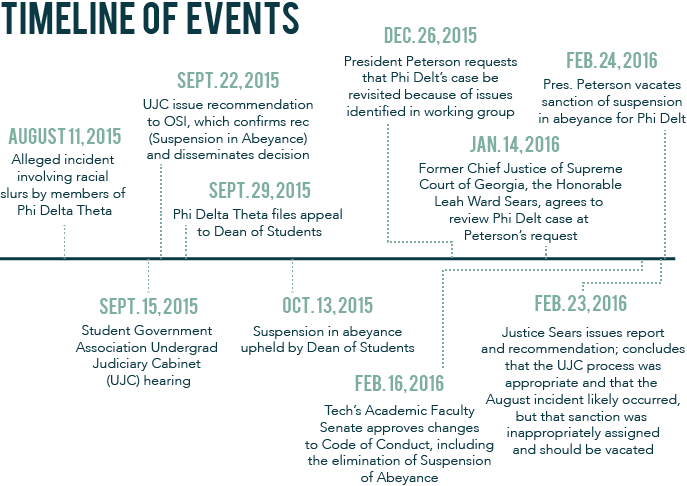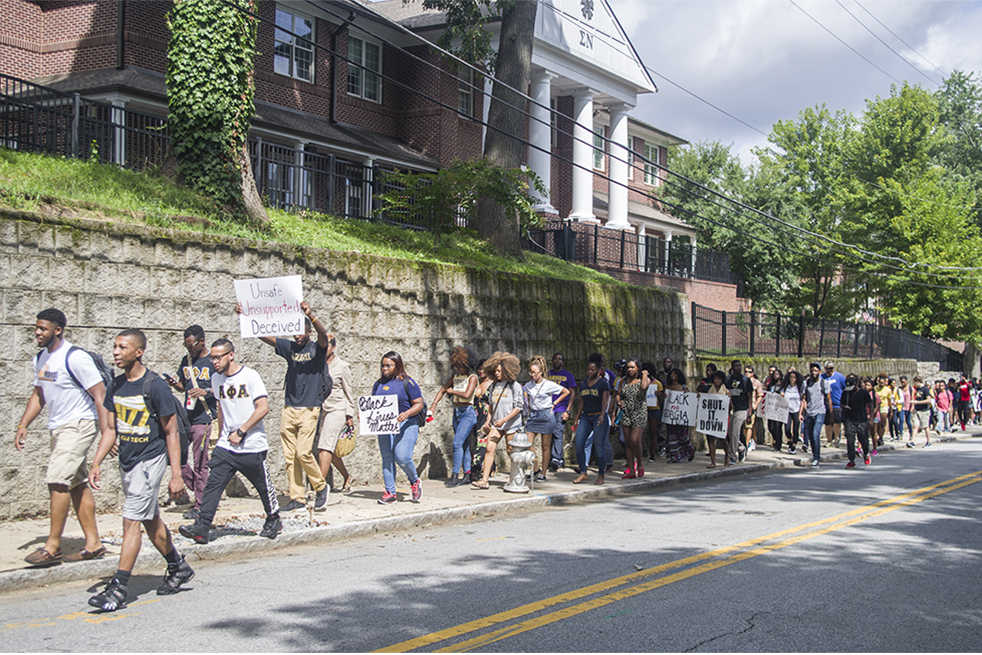More than six months after an alleged racial incident at the Phi Delta Theta house, a former Chief Justice of the Georgia Supreme Court has released a third-party review and recommendation on the fraternity’s case.
Tech released an official statement Feb. 24 upon President G.P. “Bud” Peterson’s decision to permanently lift the sanction of suspension in abeyance which had been previously imposed.
“The Honorable Leah Ward Sears, former chief justice of the Georgia Supreme Court, has completed her review of the Phi Delta Theta case process, findings and sanctions,” said Lance Wallace, Director of Media Relations and Issues Management.
“The Institute retained Sears to review the appeal of the case, after the Undergraduate Judicial Cabinet (UJC) found the fraternity responsible for two separate incidents of racial slurs directed at Georgia Tech students. The UJC’s recommendations were upheld.
“As part of the review, Sears determined Phi Delta Theta was granted due process in the investigation as well as in the student judicial proceedings and the associated appeals.
“In addition, she found that there was sufficient evidence for the UJC to conclude that the Aug. 11, 2015, incident had occurred as the victim described in her complaint against the fraternity. Sears also noted, however, that Tech policy requires that in order for an entire organization to be held collectively responsible, those involved must have received the consent or encouragement of the organization, its leaders or its officers.
“Because the UJC found that the Phi Delta Theta leadership was not complicit, Sears recommended the sanction of Suspension Held in Abeyance be lifted.”
The announcement came with the release of a number of relevant documents from Justice Sears’ third-party investigation.
The thirty-page report detailing Sears’ review process as well as her findings is available on Tech’s News Center.
In short, the report reiterates the details of the case against Phi Delta Theta, as well as the Office of Student Integrity’s involvement and Tech’s policies as outlined in the Code of Conduct.
It concludes that, while there was sufficient evidence that the Aug. 11 incident was more likely to have occurred than not — in line with the preponderance of evidence standard set by the state — the sanction of Suspension in Abeyance was utilized inappropriately.
Per Tech’s policies, Suspension in Abeyance was to be placed on organizations only if a culture of misconduct had been fostered by leadership.
There is no evidence suggesting that Phi Delta Theta leaders were aware of the alleged racist incident, nor was there any encouragement of such an environment within the fraternity.
The UJC recognized this finding but recommended Suspension in Abeyance in error, and thus Justice Sears suggested the removal of the suspension.
Given the lack of specific offenders to attribute to the incident, there are no further OSI investigations in process with regards to Phi Delta Theta.
Also released with the announcement were a letter from Justice Sears with an overview of the investigation’s findings, as well as a letter to Phi Delta Theta from President Peterson.
The latter document is dated Feb. 24 and addresses Peterson’s decision to entertain an “extraordinary appeal” to the Dean of Students’ decision in light of concerns raised by a working group convened to assess the OSI process.
“I have adopted the Recommendation of Justice Sears that the sanctions against Phi Delta Theta be lifted and the previously imposed sanction … be vacated immediately,” Peterson wrote. “The Georgia Tech Office of Student Integrity is so directed.”
Student groups had varying reactions to the decision.
“After reading the report, the most important thing to notice is that the Incident on Aug. 11 did, in fact, occur,” said Henderson Johnson II, fourth-year aerospace engineering student and leader with the Black Student Experience Taskforce.
“Although I am ultimately disappointed with the decision, I understand that within the context of our Code of Conduct the sanction can’t stand.
“Furthermore, the Black Student Experience Taskforce will continue to work tirelessly to bring forth quality recommendations to help Georgia Tech reach greater levels of inclusivity so that no student’s experience is in any inhibited due to their race [or] religion.”
Numerous members of Black Student Organizations will be joining President Peterson on Monday for a town hall discussing the results of the investigation and what they mean for different communities on Tech’s campus.
“Bud is clearing the air regarding what was mentioned in the [Feb. 24] Daily Digest article … and the resolution of the Phi Delta Theta incident,” Johnson said. “For a lot of the Black community the article is scary because it comes off as though all of our hard work was for nothing, when it really wasn’t.”
“We’re pleased that this unjust decision has been reversed,” said Jonathan Hawkins, legal counsel for Phi Delta Theta. “Yet we remain disappointed that there were sanctions in the first place. The appeal decision supports what we have said all along: Phi Delta Theta is innocent of the charges against it. Unfortunately, Georgia Tech leadership ignored evidence from the beginning that would have avoided this unwarranted eight-month sanction.”
“We hope Tech’s leadership has learned something from this process,” Hawkins said.
The UJC was not able to be reached for comment.

